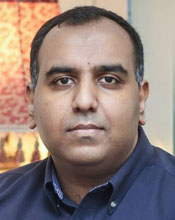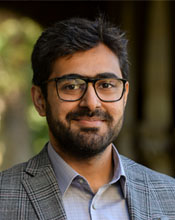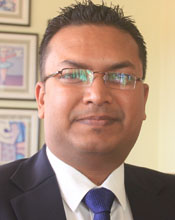Mar. 31, 2021 |
A densely populous region with porous borders, recurring interstate crises, three growing nuclear weapon programs, and expansive regional connectivity projects, South Asia is critical to global considerations of border security. Panelists will discuss the regional threat landscape: major threat actors; key official stakeholders for interdiction; land/maritime/air pathways for illicit movement; existing cooperation among regional and international stakeholders; prospects for cooperative security; and potential roles for emerging technologies.
Securing borders from illicit movement of conventional munitions, narcotics, human labor, sensitive radiological and nuclear materials, and (dual use) technologies presents a key transnational challenge in the 21st century. State efforts to understand threat actors, pathways for illicit movement, and the efficacy of countermeasures may benefit from information sharing and a cooperative approach to securing borders. A densely populous region with porous borders, recurring interstate crises, three growing nuclear weapon programs, and expansive regional connectivity projects, South Asia is critical to global considerations of border security. Panelists will discuss the regional threat landscape: major threat actors; key official stakeholders for interdiction; land/maritime/air pathways for illicit movement; existing cooperation among regional and international stakeholders; prospects for cooperative security; and potential roles for emerging technologies.
Please register to receive the link to watch the online event. Email CMC@sandia.gov with questions for the speaker before or during the event, or with questions about the event. If you can’t make the live event, a recording will be accessible on this event page for later viewing.
Panelists

Shafqat Munir (@shafqatmunir) is currently Head of Bangladesh Centre for Terrorism Research (BCTR) and Research Fellow at the Bangladesh Institute of Peace and Security Studies (BIPSS). He is also a Senior Fellow (Non-Resident) at the Institute of National Security Studies, Sri Lanka (INSSSL). In addition to research and analysis on CVE, he also focuses extensively on strategic and security issues in the Indo-Pacific region. At BIPSS, Mr. Munir oversees a number of projects and coordinates the track 1.5 and track 2 dialogues organized by the institute. Awarded numerous fellowships, Mr. Munir was most recently an Indo Pacific Security Studies Fellow at the Daniel K Inouye Asia Pacific Center for Security Studies in Hawaii. Mr. Munir has published numerous articles, chapters in edited volumes, and op-eds on strategic and security issues. His latest publication is a book chapter on the implications of the Indo-Pacific strategy for Bangladesh, published in November 2020. Mr. Munir has participated in international conferences, such as the Munich Security Conference, Shangri La Dialogue, Raisina Dialogue, and lectures at the National Defence College in Bangladesh on counter terrorism issues.

Asfandyar Mir (@asfandyarmir) is a Postdoctoral fellow at the Center for International Security and Cooperation at Stanford University. Mr. Mir holds a Ph.D. in Political Science from the University of Chicago. His research interests span international security and comparative politics, with current work focusing on counterinsurgency, counterterrorism, drone warfare, political violence, al-Qaida, and South Asian security issues. Some of his research has appeared in International Security, International Studies Quarterly, and Security Studies.

Ruhee Neog (@ruheeneog) is a security and foreign policy analyst and Director of the Institute of Peace and Conflict Studies (IPCS) in India. Her research considers the role of norms, language, and institutions in determining choices and behavior in international relations. Nuclear policy, emerging technologies, and cyber security are areas of particular interest. She has a wide-ranging portfolio of writing and speaking engagements at the national and international levels. At IPCS, Ms. Neog is responsible for setting and supervising research and programmatic mandates across all its verticals. She is currently visiting fellow at the CMC at Sandia National Laboratories, and visiting faculty at the Indian Ministry of Home Affairs’ Central Detective Training School, where she lectures on the links between intelligence and foreign policy. She has been awarded research fellowships supported by the Stimson Center and Nuclear Threat Initiative. Past appointments include political and policy work with the Houses of Lords and Commons, and Bell Pottinger, a public affairs firm, in the UK. Ruhee has a postgraduate degree in History of International Relations from the London School of Economics and an undergraduate degree in Literature from St. Stephen’s College, Delhi University.

Dr. Pramod Jaiswal (@contactniice) is a Research Director at Nepal Institute for International Cooperation and Engagement and General Secretary of Center for Diplomacy and Development and is a current Visiting Fellow at the CMC at Sandia National Laboratories. He has been a regular and visiting faculty at different universities of Nepal (Tribhuvan University, Kathmandu University and Pokhara University) and China (China Foreign Affairs University, Beijing; Fudan University, Shanghai and Tongji University, Shanghai). He is a Senior Fellow at the Institute of Peace and Conflict Studies, New Delhi. Previously, Dr. Jaiswal worked with Manohar Parikkar Institute for Defence Studies and Analyses, New Delhi and as Delhi Correspondent with the Rising Nepal. He is the Member of the Editorial Board, Journal of International Affairs, Kathmandu; Member of the Academic Committee at the Pangoal Institution, Beijing; Member of International Advisory Committee, Journal of Liberty and International Affairs, Macedonia; and the Member of the Editorial Board, Gandhara Journal of Research in Social Science, Pakistan and member of Subject Committee of International Relations and Diplomacy, Tribhuvan University. Mr. Jaiswal holds Masters, M. Phil, and PhD from School of International Studies, Jawaharlal Nehru University, New Delhi. He has authored, edited, and co-edited around dozens of books on China and South Asia affairs.
Moderator

Hannah Haegeland (@HHaegeland) is a Senior Member of the Technical Staff at Sandia National Laboratories with expertise in Indian Ocean Region and South Asian regional security, nuclear issues, interstate crises, and risk reduction. She manages South Asia engagement for Sandia’s CMC, promoting global security in the 21st century through scientific engagement. In this capacity, Ms. Haegeland convenes Track 1.5 and Track 2 engagements, designs and facilitates wargames and tabletop exercises, leads cooperative research studies between the CMC and partner countries, and supports Sandia training workshops, courses, and laboratory visits. Her recent research focuses on cyber and emerging technology-enabled escalation in Southern Asia and prospects for cooperative risk reduction measures. Ms. Haegeland is a co-editor and author of Investigating Crises: South Asia’s Lessons, Evolving Dynamics, and Trajectories (Stimson, 2018) and her analysis has been featured in a variety of policy outlets including Foreign Affairs and the Bulletin of Atomic Scientists. Prior to joining Sandia, Ms. Haegeland held research and teaching positions in Kathmandu, New Delhi, and Washington, D.C.